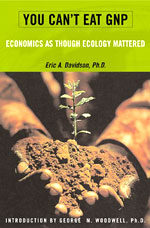伊莉莎白.葛羅斯曼著
11.10.00

GNP是不能吃的:經濟學與生態學的關係Eric A. Davidson Perseus著,247頁,2000年
Eric Davidson在他的新書GNP是不能吃的中提到:「根據GNP的定義,當我們花費越多表示經濟景況越好」。所謂的國民生產毛額(GNP, Gross National Product)是指一個國家內所生產及交易的商品及勞務的總和,是一種傳統衡量一國經濟福祇的方法。大約在過去十年內,有越來越多的經濟學者、社會學者以及觀察家們發現到此一衡量系統的缺陷。當Davidson擔任和平工作團(Peace Corps)在薩伊的志工時,他學到了一件事--GNP不僅無法計算出一個國家的醫療、教育及福利系統,也無法指出在環境及其它生產的商品及勞務長期而全面的成本。
GNP是不能吃的這本書可以當作一種新經濟的入門書,這種新經濟就像地球日(Earth Day)創立者Gaylord Nelson所說的:「是一種完全屬於環境的附屬品」。在這種說法下,環境影響不再只是抽象的名詞,它還應該是在商業活動中有形的成本。在這樣的觀念下,「自然資本」,這種由大自然所提供且是人類所無法製造的商品勞務,必需加到資產負債表內,並且當作是一種珍貴的有價捐贈或儲蓄,而不該任意遭到浪費。
Davidson是一位受過訓練的土壤學家,他目前的研究焦點集中在農地和森林的關係,這也就是他為什麼以生態學家的觀點來看GNP。他簡短快速但清晰的生態經濟的介紹之旅,看來是為那些並不熟悉此類討論的讀者而寫的。但對於那些已經拜讀過Herman Daly 、Paul Hawken 、Amory及Hunter Lovins 、Jane Jacobs 、Alan Durning、 Lester Brown 、Robert Frank或Juliet Schor等等著作的讀者而言,大概只能在這本書中找到一點新意。
不過,Davidson的確提供了不錯的觀念給在這一領域的新進者,而且在許多艱深的議題上,他也均有觸及。在本書的總論裡,他處理的問題包括人口成長、生物多樣性、重貼現 率(註)、土壤沖蝕、森林保育、可持續性農業發展及科技等等。在這本書的最後也是最發人深省的一章中,Davidson提出一些他自稱為「具有深遠影響力的溫和謹慎的方案」。除了要求讀者檢視自身對生態的影響,他也提出以下觀點:取消擁有兩個孩子以上家庭的減稅制度,增加消費稅,取消助長空氣、水及土壤惡化的補助資金,以及簽訂國際協定來保護世界自然資源。
GNP是不能吃的這本書可能不是要打破現有的規則,它只是提出一個清楚而有力的個案,讓我們重新思考衡量經濟福祇的方法,並且揭示一個強而有力的法則:健全的經濟結構必需依賴健康的環境--一個我們無法忽視的觀念。
Elizabeth Grossman is coeditor of Shadow Cat: Encountering the American Mountain Lion. She writes from Portland, Ore
[註]重貼現率:即一般銀行資金不夠時,除同業間相互調借外,便向中央銀行融通借款。借款方 式,便是用手上現有的商業票據向中央銀行重貼現,以獲得資金。這種重貼現時支付的利率叫重貼現率。
數據解讀
重貼現率,常為中央銀行控制通貨的手段之一。即當市面資金過多時,中央銀行可提高利率,以促進市場一般利率提升。反之則降低重貼現率使市場利率下跌。 想要預測市場利率的可能變動,重貼現率,常是最好的先行指標。
全文及圖示詳見:http://www.gristmagazine.com/grist/books/
books111000.stm
版權歸屬 Grist Magazine 環境信託基金會(鄧國光 譯, 林子倫 審校)
中英對照譯稿請見:http://news.ngo.org.tw/issue/surround/2000/issue-surround00122801.htm
|
|
by Elizabeth Grossman 11.10.00
You Can't Eat GNP: Economics As Though Ecology Mattered By Eric A. Davidson Perseus, 247 pages, 2000
"The more money we spend, according to the GNP ... the better off we are," explains Eric Davidson in You Can't Eat GNP. The Gross National Product, or GNP in common parlance, is the cumulative value of products and services created and traded by a nation, and the traditional measure of economic well-being. Yet in the past decade or so, the flaws in this measuring system have become increasingly clear to a growing number of economists, social scientists, and other observers. As Davidson learned during his time as a Peace Corps volunteer in Zaire, not only does the GNP fail to account for the state of a country's health-care, education, and welfare systems -- it also fails to recognize the overall and long-term costs, environmental and otherwise, of producing goods and services.
You Can't Eat GNP is a primer for a new school of economics in which the economy is considered "a wholly owned subsidiary of the environment," in the words of Earth Day founder Gaylord Nelson. Under this rubric, environmental impacts must be considered not only in the abstract, but tallied up along with more tangible costs of doing business. Within this scheme, "natural capital," those goods and services that nature provides and humans cannot create, must be added to the balance sheet and treated as a valuable endowment or nest egg too precious to be squandered.
A soil scientist by training, Davidson's current research focuses on the relationship between agricultural land and forests, so he approaches the GNP with an ecologist's perspective. His whirlwind but trenchant tour of ecological economics seems to be aimed at readers not already familiar with these discussions. Those who have read Herman Daly, Paul Hawken, Amory and Hunter Lovins, Jane Jacobs, Alan Durning, Lester Brown, Robert Frank, or Juliet Schor, to name but a few, will probably find little new in You Can't Eat GNP.
Still, Davidson provides a good perspective on the field for newcomers, and he does not shy away from any of the hard subjects. In his overview, he tackles population growth, biodiversity, discount rates, global warming, soil erosion, forest protection, sustainable agriculture, and technology. In his final and most provocative chapter, Davidson makes what he calls "some modest proposals for profound changes" in how the world does business. In addition to asking readers to examine their own ecological impacts, he calls for the elimination of tax deductions for more than two children, an increase in consumption taxes, an end to subsidies that encourage degradation of air, water, and soil, and the signing of international agreements to protect natural resources worldwide.
While You Can't Eat GNP probably does not break any new ground, it presents a clear and cogent case for rethinking our measures of economic well-being and a sturdy introduction to the principle that a health economy depends on a healthy environment -- a notion we can't afford to ignore.
Elizabeth Grossman is coeditor of Shadow Cat: Encountering the American Mountain Lion. She writes from Portland, Ore
http://www.gristmagazine.com/grist/
books/books111000.stm
|
